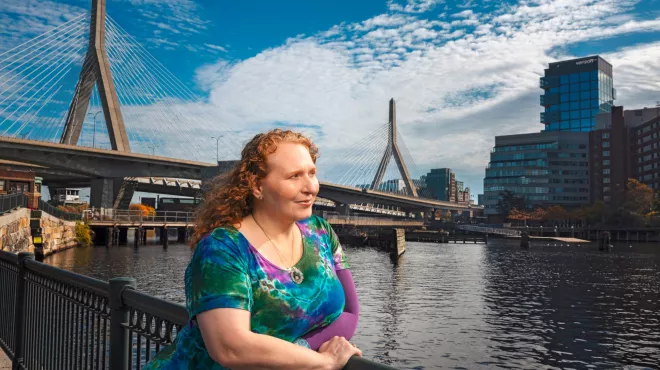Helga: shifting passions to help others following diagnosis
At age 35, Helga was diagnosed with early-stage breast cancer. She thought, “OK, I’m going to get cured and move on.” As she was finishing her treatment, Helga’s doctor told her in passing that there was a chance that her breast cancer could come back – but that was the end of the discussion. She recalls being told to not spend too much time on the internet because the information she might find about recurrence and metastatic breast cancer (MBC) could be “terrifying.”
Nearly 30% of women initially diagnosed with early-stage disease will ultimately develop metastatic breast cancer.
Looking back, she wishes she understood what a recurrence could look like, because 18 months after her initial diagnosis, her breast cancer came back as metastatic disease (when cancer cells spread to new parts of the body, such as the lungs, liver and bones). Helga remembers needing to wrap herself mentally and emotionally around the recurrence. Like most women in their 30s, she was focused on her career, relationship and starting a family; to receive the news that her illness was incurable was devastating.

Helga is not alone. In the US, premenopausal metastatic breast cancer in women is growing in prevalence. Nearly 1 in 7 of the individuals living with metastatic breast cancer is younger than 50 years old, and younger patients typically face unique challenges associated with the disease.
“Younger women tend to have a whole different host of challenges that are very different from postmenopausal women,” says Dr. Nikita C. Shah, medical oncology team leader at Orlando UF Health Center*. “[The younger patient] is probably trying to work full-time, take care of her kids, and deal with metastatic disease. It’s a whole different ballgame for younger patients with the same disease compared to an older patient with metastatic breast cancer.”
At 39 years old and after living with breast cancer for four years, Helga made the difficult decision to retire from her career of 16 years as a highway engineer to focus on her health. “This disease comes and takes over your life,” Helga says about her lifestyle changes. “You have to think of things that people typically [think about] later in life.”
When interacting with the metastatic breast cancer community as a patient advocate, especially with those who are newly diagnosed, she hopes that others will be able to learn from her story. She encourages others to “learn as much as you can. It doesn’t matter if you’re stage 0 or stage IV – learn as much as you can about your disease. That way you can be a very active member in your care.” As no two people are alike, no two metastatic breast cancer experiences are either.
It doesn’t matter if you’re stage 0 or stage IV – learn as much as you can about your disease. That way you can be a very active member in your care.
Helga, living with metastatic breast cancer
April: a new mother coping with a metastatic breast cancer diagnosis
Similar to Helga, April learned that her breast cancer had recurred and spread to her bones during a five-year checkup. She was only 36, and the diagnosis blindsided her. Like many others, she didn’t know that her breast cancer could recur as metastatic disease in other places in her body, especially at such a young age. “My immediate thought was: I have bone cancer now?” she says.

In the five years between diagnoses, April had what she refers to as “a little miracle” with the birth of her son, Colin. She had been told after her first breast cancer diagnosis that she would never have kids, despite all of her efforts to get pregnant in the years prior. “I wasn’t ready to not be a mom, and as luck would have it, as soon as I finished chemo, I was pregnant three months later.”
April had to learn how to be a parent while managing her disease. Her son is now 7 years old – and given her advocacy work, treatments and full-time job, “spare time” is not in April’s vocabulary. She says she is dedicated to making sure her son has all that he deserves, even though the only life he knows is with his mom living with metastatic disease.



